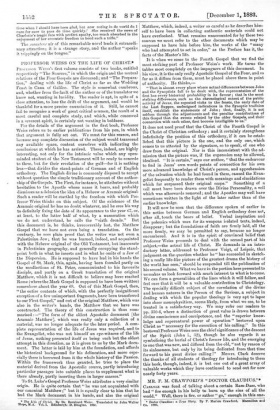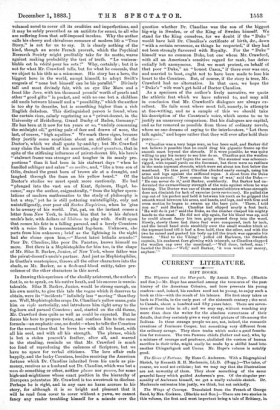MR. F. M. CRAWFORD'S "DOCTOR CLAUDIUS."* CARLYLE was fond of
talking about a certain Ram-Dass, who had "fire enough in his belly to burn up the sins of all the world." Well, there is fire, or rather "go," enough in this one- Doctor Claudius: a True Story. By F. Marion Crawford. Macmillan ai.d Co. 1883.
volumed novel to cover all its crudities and imperfections, and it may be safely prescribed as an antidote for ennui, to all who are suffering from that self-imposed incubus. Why the author calls his cheery and chivalrous romance of modern life a "True Story," is not for us to say. It is clearly nothing of the kind, though an acute French proverb, which the Psychical Research Society might profitably take for its motto, warns against making probability the test of truth. "Le vraisem- blable eat la vdrite pour lea sots !" Why, certainly ; but it is not for what Mr. Crawford tells, but for what he conceals, that we object to his title as a misnomer. His story has a hero, the biggest hero in the world, except himself, to adopt Swift's exegesis of "none but himself can be his parallel." Divinely tall and most divinely fair, with an eye like Mars and a front like Jove. with ten thousand pounds' worth of pearls and other " good gifts" in pocket, and with no one but a childless old uncle between himself and a "possibility," which the author is too shy to describe, but is something higher than a rich English dukedom. This distinguished person is found, when the curtain rises, calmly vegetating as a " privat-docent, in the University of Heidelberg, Grand Duchy of Baden, Germany." He has been at it now for ten years or so, "unduly consuming the midnight oil," getting pale of face and drawn of nose, the last, of course, "high aquiline." We mark these signs, because they justify some scepticism about an athletic feat of the Doctor's, which we shall quote by-and-by; but Mr. Crawford may claim the benefit of his assertion, valeat quantum, that in spite of the stiffening influences of privat-docent life, his hero's "stalwart frame was stronger and tougher in its manly pro- portions " than it had been in his stalwart days "when he handled Bellinger and sabre" en maitre, and, "like a true son of Odin, drained the great horn of brown ale at a draught, and laughed through the foam on his yellow beard." Of the Doctor's studies we must speak more cautiously. He bad "plunged into the vast sea of Kant, Spinoza, Hegel, be- cause," says the author, enigmatically, "from the higher specu- lations of modern mathematics to the study of philosophy is but a step," yet he is still pottering unintelligibly, only not unintelligently, over poor old Sextus Empiricus, when he 'gins to be aweary of his world. Pat, pat, on the instant comes a letter from New York, to inform him that he is his defunct uncle's heir, with dollars ad libitum to play with. Swift upon that comes his fate in a falling parasol, and a lovely Countess, with a voice like a transcendental fog-born. Unknown, she parts from him unknown ; brief as the lightning in the night had she shone upon him,—" Efteret lateri lethalis arundo!" Poor Dr. Claudius, like poor Dr. Faustus, knows himself no more. But there is a Mephistophiles for him too, in the shape of Mr. Silas B. Barker, Junior, of New York, whose father was the privat-docent's uncle's partner. And just as Mephistophiles, in Goethe's masterpiece, throws all the other characters into the shade, so Mr. Barker, as a flesh-and-blood entity, takes pre- cedence of the other characters in this novel.
In drawing this specimen of the shoddy aristocrat, the author's foot is, so to speak, on his native heath, and his success is unmis- takeable. Silas B. Barker, Junior, would be strong enough, on his own merits, to give this tale the vogue which it deserves to obtain, were its " incidents " infinitely less " moving " than they are. Well, Mephistophiles crops Dr. Clandius's yellow mane, puts him en rbgle sartorially, and introduces him right away to the fog-born and parasol Countess ; and, started on the old theme, Hr. Crawford does quite as well as could be expected. But he forces his hero to propose twice, and confines him to the same formula—an emphatic one, no doubt—when he tells the Countess for the second time that he loves her with all his heart, with all his soul, and with all his strength. The phrase, which is but a stolen peacock's feather, after all, and marred in the stealing, reminds us that Mr. Crawford is much too fond of reproducing the cadences of Scripture, but we have no space for verbal citicisms. The love affair ends happily, and the lucky Countess, besides receiving the American fortune which Dr. Claudius inherited from his uncle as pin. money, receives as a husband not Dr. Claudius, which was but a twin de something or other, neither plume nor guerre, for some high-and-mightiness whose exact position in the hierarchy of European potentates Mr. Crawford is too awestruck to disclose. Perhaps be is right, and in any case no harm accrues to his story, for although it is so bright and pleasant that it will be read from cover to cover without a yawn, we cannot fancy any reader troubling himself for a minute over the
question whether Dr. Claudius was the son of the biggest big-wig in Sweden, or of the King of Sweden himself. We stand for the King ourselves, for we doubt if the "Duke" would have laid Dr. Claudius's certificate of birth, Sre., down "with a certain reverence, as things he respected," if they had not been strongly flavoured with Royalty. For the " Duke " himself was no common Duke, but one whom Mr. Crawford, with all an American's sensitive regard for rank, has defer- entially left anonymous. But we mutt protest, on behalf of that poor "Duke," an "honest Casca," if there ever was one, and married to boot, ought not to have been made to lose his heart to the Countess. But, of course, if the story is true, Mr. Crawford had no alternative. In that case, we hope the "Duke's" wife won't get hold of Doctor Claudius.
As a specimen of the author's lively narrative, we quote the athletic feat which we have referred to, and may add in conclusion that Mr. Crawford's dialogues are always ex- cellent. He fails most where most fail, namely, in attempts at fine-writing, and as a sample of this we should take his description of the Countess's voice, which seems to us to justify an unsavoury comparison. But his dialogues are capita}, and as far removed as possible from those of ordinary novels, where no one dreams of saying to the interlocutors, "Let them talk again," and hopes rather that they will ever after hold their peace :—
" Claudius was a very large man, as has been said, and Barker did not believe it possible that be could drag his gigantic frame up the smooth mast beyond the shrouds. If it were possible, he was quite willing to pay his money to see him do so. Claudius put the woollen cap in his pocket, and began the ascent. The steamer was schooner- rigged, with topsail yards on the foremast, but there were no ratlines in the main.topmast shrouds, which were set about ten feet below the masthead. To this point Claudius climbed easily enough, using his arms and legs against the stiffened ropes. A shout from the Duke bailed his arrival. 'Now comes the tug of war,' said the Duke.— ' He can never do it,' said Barker, confidently. But Barker had un- derrated the extraordinary strength of the man against whom he was betting. The Doctor was one of those natural athletes whose strength does not diminish for lack of exercise (avis rarissima). He pulled the cap out of his pocket and held it between his teeth as he gripped the smooth wood between his arms, and hands, and legs, and with firm and even motion he began to swarm up the bare pole. There, I told you so !' said Barker. Claudius had slipped nearly a foot back.
He will do it yet !' said the Duke, as the climber clasped his mighty hands to the mast. He did not slip again, for his blood was up, and be could almost fancy his iron grip pressed deep into the wood. Slowly, slowly those last three feet were conquered, inch by inch, and the broad hand stole stealthily over the small wooden truck at the topmast-bead till it had a firm hold, then the other, and with the two he raised and pushed his body up till the truck was opposite his
breast. Skal to the Viking ! ' yelled old Harleson, the Swedish captain, his sunburnt face glowing with triumph, as Claudius clapped the woollen cap over the masthead.—' Well done, indeed, man ! ' bawled the Duke.—' Well,' said Barker, 'it was worth our money, anyhow.'"







































 Previous page
Previous page